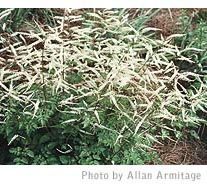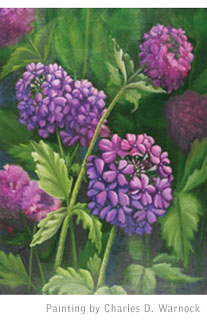


Research Blooms in the Garden
by Jamie Palmer & Nicholas Porter
Part I | Part II | A Sampling From the Garden


“You
are going to start seeing this plant everywhere by 2004, I hope, and it’s
going to be called Aruncus ‘Misty Lace,’” said Allan Armitage.

The
No. 1 selling verbena in America, ‘Homestead Purple,’ was introduced
by the UGA Trial Gardens.
Part II
In his quest to brighten the Southern landscape, Armitage has ranged the globe with recent forays in Australian and European landscapes and gardens. From Australia he introduced a Lantana ‘Athens Rose’ named for the rose-colored flowers; from Ireland the bleeding heart ‘Athens Yellow.’
He’s also begun to do more hybridization and breeding through the university’s New Crop Program. Each plant introduced through the New Crop Program is first researched and rated at the UGA Trial Gardens. Outstanding successes include the ‘Sunlover’ series of coleus, the forerunner of the dozens of “sun coleus” seen in landscapes and retail stores today, and the cleome ‘Linde Armstrong,’ named for two North Carolina gardeners who brought the original plant to his attention. Plants like tibouchina ‘Athens Blue’ and rosemary ‘Athens Blue Spires’ are also among those that have made their mark in the ornamental market.
The trial gardens, located near UGA’s College of Pharmacy, serves as both a research plot and a hands-on teaching facility. Students play a vital role in its success. While faculty and staff conduct the research, Armitage employs horticulture students — “Armi’s Army” to those in the know — to keep the plants healthy and the gardens enticing to visitors.
The gardens saturate the senses with floral sights and smells. Said student worker Laura Thompson, “I even saw someone propose in the gardens.”
But it’s also a serious teaching laboratory, a place where Armitage imparts the art and science of horticulture to his charges.
“I like to think that my contribution is in getting people, especially my students, excited about the wonders of plants,” Armitage said.
“I guess I’m passing on the passion,” he said. “‘Homestead Purple’ is going to disappear one day and all the ‘Margaritas’ will also be replaced by something else, but the passion that we have instilled in students — I think that will be around for a while.”
Such an attitude has earned Armitage honors for his teaching skill as well as his research. He was recognized as one of the best teachers in the country when he received the National Educator Award from the American Horticultural Society and has been named Educator of the Year by the Georgia Green Industry Association. He also received the Medal of Honor, the highest award granted by the Garden Club of America, and the Gold Medal of Achievement from the Massachusetts Horticultural Society.
Among his more than 250 articles and nine books on horticultural subjects, his text Herbaceous Garden Perennials — a standard reference on the subject — was designated by the American Horticultural Society as one of the 75 most important horticultural books written in the past 75 years.
For all his personal passion, preparing a new plant variety for the public is rewarding, but it’s also plain, hard work. The garden exists to provide a place where cultivars can be planted, studied, evaluated and rated. Each cultivar — shorthand for cultivated variety — undergoes a performance rating based on qualities such as flowering, height, uniformity, and drought and disease resistance. Those that receive the highest rating are colorful, withstand Georgia’s heat and humidity, and resist disease. Only then are they recommended for commercial sales.
Armitage is quick to credit Meg Green, supervisor of the trial gardens, as the person most responsible for its success. “Meg does everything; she is the greatest,” said Armitage. Green tracks the growth of each plant from the time the seed is planted in a small container, through its transplantation into the ground as a young plant, to its evaluation and finally — if it passes muster — its introduction to the market.
Her job is never-ending. “Every two weeks I go through and evaluate every single cultivar,” said Green. “And this past year we had more than a thousand different cultivars.”
“When I’m taking the data, I am looking to see among other qualities if the plants are basically the same height and in the same states of flowering,”she said. “People want everything to bloom at the same time.”
Apart from the new material Armitage introduces from his travels, most of the seeds the gardens receives come from companies — many of them international — that want the university to test a plant’s potential for sales in the Southeast. Income received from these companies pays the gardens’ student workers; No university money is used to fund the gardens’ day-to-day expenses.
“Every year we get more plant submissions so we have to be more creative in using gardening space,” Green said. “We keep adding containers, which are one of the ways that just about anybody can grow plants. You can put a container on the porch or an apartment balcony to brighten up the place.”
In spring 2000, the trial gardens implemented the Athens Select™ program through UGA’s research foundation, which administers the sale of cuttings by selected commercial growers to retailers across the country. The program has expanded to Japan and is being evaluated in Europe and Canada. Armitage chooses only the toughest plants for Athens Select — ones that show superior performance in extreme heat and humidity. Each bears the Athens Select trademark — UGA’s seal of approval — and yields a three-cent royalty: a penny for marketing and two cents for the trial gardens.
“We have such a terrific partnership with the industry,” Armitage said. “Essentially they make this program work. They’re putting all the money into the promotion and the production and propagation.”
Ultimately, the trials and the tribulations pay off for all parties: researchers, growers, retailers and consumers alike. But to truly appreciate the work — and to get a peek at ornamentals being evaluated — “a visit is a must,” Armitage said. “The garden is open all day every day and all visitors are welcome.”
For more information, email Allan Armitage at armitage@uga.edu or access www.uga.edu/ugatrial or www.athensselect.com.
Jamie Palmer
received her bachelor’s degree in agricultural communications from
UGA this past May and is currently pursuing a master’s degree in
Agricultural Leadership.
Nicholas Porter is a free-lance editor and writing coach in Atlanta.
Illustrator Charles D. Warnock paints large-scale flowers to help people “see flowers anew in a different light and to offer my perspective on a familiar subject that is often taken for granted.” The retired U.S. Air Force master sergeant received a master of fine arts from the University of Georgia in spring 2003.
Part I | Part II | A Sampling From the Garden
For comments or for information please e-mail the editor: jbp@ovpr.uga.edu
To contact the webmaster please email: ovprweb@uga.edu
![]()